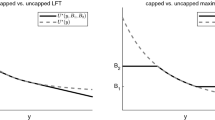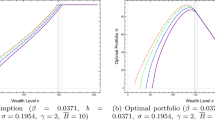Abstract
We study a robust maximization problem from terminal wealth and consumption under a convex constraints on the portfolio. We state the existence and the uniqueness of the consumption–investment strategy by studying the associated quadratic backward stochastic differential equation. We characterize the optimal control by using the duality method and deriving a dynamic maximum principle.
Similar content being viewed by others
References
Anderson, E., Hansen, L.P., Sargent, T.: A quartet of semigroups for model specification, robustness, prices of risk and model detection. J. Eur. Econ. Assoc. 1, 68–123 (2003)
Barrieu, P., El Karoui, N.: Pricing, Hedging and Optimally Designing Derivatives via Minimization of Risk Measures. In: Carmona, R. (ed.) ‘Indifference Pricing: Theory and Applications, pp. 77–141. Springer, Paris (2008)
Bordigoni, G., Matoussi, A., Schweizer (2007). A Stochastic control approach to a robust utility maximization problem. F. E. benth et al. (eds.), Stochastic Analysis and applications. Proceedings of the second Abel symposium, Oslo, 2005, Springer, pp. 125–151.
Cvitanic, J., Karatzas, I.: Convex duality in constrained portfolio optimization. Ann. Appl. Prob. 2, 767 (1992)
Delbaen, F., Schachermayer, W.: A general version of the fundamental theorem of asset pricing. Math. Ann. 300, 463–520 (1994)
Duffie, D., Skiadas, C.: Continuous-time security pricing: a utility gradient approach. J. Math. Econ. 23, 107–131 (1994)
El Karoui, N., Peng, S., Quenez, M.C.: A Dynamic maximum principle for the optimization of recursive utilities under constraints. Ann. Appl. Prob. 3, 664–693 (2001)
Föllmer, H., Kramkov, D.: Optional decomposition under constraints. Prob. Theory Relat. Fields 109, 1–25 (1997)
Faidi, W., Matoussi, A., Mnif, M.: Maximization of recursive utilities. A dynamic maximum principle approach. SIAM J. Financ. Math. 2, 1014–1041 (2011)
Karatzas, I., Lehoczky, J.P., Shreve, S., Xu, G.L.: Martingale and duality methods for utility maximization in an incomplete market. SIAM J. Control Optim. 29, 702–730 (1991)
Karatzas, I., Shreve, S.: Brownian Motion and Stochastic Calculus, 2nd edn. Spinger, Berlin (1991)
Kramkov, D., Schachermayer, W.: The asymptotic elasticity of utility functions and optimal investment in incomplete markets. Ann. Appl. Prob. 9, 904–950 (1999)
Luenberger, D.: Optimization by vector space methods. Wiley, New York (1969)
Merton, R.: Optimum consumption and portfolio rules in a continuous-time model. J. Econ. Theory 3, 373–413 (1971)
Pham, H.: Minimizing shortfall risk and applications to finance and insurance problems. Ann. Appl. Prob. 12(1), 143–172 (2002)
Quenez, M. Q. (2004). Optimal portfolio in a multiple-priors model. in R. Dalang, M. Dozzi and F. Russo (eds;), Seminar on Stochastic Analysis, Random Fields and applications IV, Progess in Probability 58, Birkhauser, pp. 291–321.
Rockafellar, R.T.: Convex Analysis. Princeton University Press, Princeton (1970). Tenth printing version
Schied, A., Wu, C.T.: Duality theory for optimal investments under model uncertainty. Stat. Decis. 2, 199–217 (2005)
Skiadas, C.: Robust control and recursive utility. Financ. Stoch. 7, 475–489 (2003)
Schroder, M., Skiadas, C.: Optimal consumption and portfolio selection with stochastic differential utility. J. Econ. Theory 89, 68–126 (1999)
Schroder, M., Skiadas, C.: Optimal lifetime consumption-portfolio strategies under trading constraints and generalized recursive preferences. Stoch. Process. Appl. 108, 155–202 (2003)
Acknowledgments
We are very grateful to Nicole El Karoui for helpful comments and fruitful discussions. Research partly supported by the Chair Financial Risks of the Risk Foundation sponsored by Société Générale, the Chair Derivatives of the Future sponsored by the Fédération Bancaire Française, and the Chair Finance and Sustainable Development sponsored by EDF and Calyon. This work was partially supported by the research project MATPYL of the Fédération de Mathématiques des Pays de la Loire.
Author information
Authors and Affiliations
Corresponding author
Appendix
Appendix
1.1 Proof of the Comparison Theorem
Denote by \(\Delta Y_t=Y^1_t- Y_t^2\), \(\Delta U_t=\check{U}^1_t- \check{U}_t^2\) and \(\Delta \bar{U}_T=\bar{U}_T^1- \bar{U}_T^2\). The pair \((\Delta Y, \int (Z^1-Z^2) dW)\) is the solution of the following equation
which implies for any stopping time \(T\ge \tau \ge t\), we have
From the inequality \(\int \limits _0^t |Z_s^1|^2ds-\int \limits _0^t|Z_s^2|^2ds-2\int \limits _0^t<Z_s^1,Z_s^2>ds+2\int \limits _0^t|Z_s^2|^2ds=\int \limits _0^t|Z_s^1-Z_s^2|^2ds\ge 0\), where \(<.,.>\) denotes the inner product associated with the euclidean norm, we deduce that
We define the probability measure \( Q^{*,2}\) equivalent to \( P\) where its density is the \(P\)-martingale \(Z^{*,2}_ T\) with
Since \(\int \limits _0^.(Z_s^1-Z_s^2)dW_s\) is a \(P\)-martingale, then \( \int \limits _0^.(Z_s^1-Z_s^2)dW_s+\frac{1}{\beta } \int \limits _0^.<Z_s^1-Z_s^2,Z_s^2>ds\) is a \( Q^{*,2}\)-local martingale. Let \((T_n)_n\) be a reducing sequence for \(\int \limits _0^.(Z_s^1-Z_s^2)dW_s+\frac{1}{\beta }\int \limits _0^.<Z^1_s-Z^2_s,Z^2>ds\), then, for \(n\) large enough, we have \(T_n\ge t\) and so
which implies
Sending \(n\) to infinity, we have \(\tau \wedge T_n\longrightarrow \tau \), \(Q^{*,2}\) a.s. and \( \Delta Y_{\tau \wedge T_n }\longrightarrow \Delta Y_{\tau }\) \(Q^{*,2}\) a.s. Since \(Y^1\) (resp. \(Y^2\)) is in \(D_0^{exp}\) and \( \check{U}^1 \) (resp. \(\check{U}^2\)) is in \(D_1^{exp}\), by the dominated convergence theorem, we have
From the stochastic Gronwall–Bellman inequality (see Appendix C, Skiadas and Schroder [20]), we have
From inequalities (2.13)–(2.14), we have \(\Delta Y_{t}\le 0\), \(0\le t\le T\),\( \,\,dt\otimes dP \text { a.s. }\) and the result follows. If \(Y_0^1\!=\!Y_0^2\), then from (6.1), we have \(E_{Q^{*,2}}[ \int \limits _0^{T}\alpha e^{-\int \limits _0^s \delta _s ds}\Delta U_s ds + \bar{\alpha }e^{-\int \limits _0^T \delta _s ds} \Delta \bar{U}_T]=0\), which implies \(\Delta U_t\!=\!0\), \(t\in [0,T]\) and \(\Delta \bar{U}_T=0\). Since the BSDE (2.2)–(2.3) have a unique solution, then \(Y_t^1=Y_t^2\), \(t\in [0,T]\) a.e. For the last point, we argue by contradiction. If \(Y_0^1=Y_0^2\), then \(\Delta U_t=0\), \(t\in [0,T]\) and \(\Delta \bar{U}_T=0\) which contradicts our assumption and so \(Y_0^1<Y_0^2\). \(\Box \)
1.2 Proof of the Continuity Theorem
We only prove the first statement. Since \(U(c^n_t)\ge U(c_t)\), for all \(0\le t\le T \) and \(\bar{U}(\xi ^n)\ge \bar{U}(\xi )\), then from the comparison Theorem 2.1, the sequence \(((Y^{x,c^n,\xi ^n})_{0\le t\le T})_n\) is also non-increasing and so
We define \((Y^{(\infty )}_t)_{0\le t\le T}\) as follows: \(Y^{(\infty ) }_t=\displaystyle \lim _{n \longrightarrow \infty }Y^{x,c^n,\xi ^n}_t\), \(0\le t\le T\). From the definition of \((Y^{x,c^n,\xi ^n}_t)_{0\le t\le T}\), we have
From inequality (6.2) and the monotonicity property of the sequences \((\xi ^n)_n\) and \(\Big ((c^n_{t})_{0\le t\le T}\Big )_n\), we have
From Cauchy Schwarz inequality, we have
From the boundedness on the discounting factor (H1) and since \((c,\xi )\in \mathcal{A}(x)\), \((c^1,\xi ^1)\in \mathcal{A}(x)\), \(Y^{x,c, \xi }\in D_0^{exp}\) and \(Y^{x,c^1, \xi ^1}\in D_0^{exp}\), we have \(g_T\in L^1(P)\). By the dominated convergence theorem, we have
Since there exists a unique solution to the BSDE (2.11)–(2.12), we have necessarily \(Y^{(\infty )}=Y^{x,c,\xi }\) and the result follows.
1.3 Proof of the Maximum Principle
We fix \(\epsilon >0\) and \(\eta >0\) such that \(\epsilon <\eta \).
First step: We prove that
We consider the following set
We define \(\xi _n\) as follows: \(\xi _n=\xi ^* +\frac{1}{n} \mathbf{1}_{A_{\epsilon ,\eta }} \).
\(\star \) We prove that \((c^*,\xi _n)\in \mathcal{A}\) : From the representation theorem under \(\tilde{P}^*\), there exists a process \(H_n\in \tilde{\mathcal{H}}\) such that
which implies that
where \(H_n^*=H^*+H_n\). For n large enough, we have \(0\le \frac{1}{n}\le \frac{\epsilon }{2}\) and so
From the standard assumptions on the utility functions (H4), we have
and so for \(n\) large enough, \(E[\exp {(\gamma |\bar{U}(\xi _n)|)}]\) is finite, which implies that \((c^*,\xi _n)\in \mathcal{A}\).
\(\star \) We prove that \(P(A_{\epsilon ,\eta })=0\) : From the definition of \(J\) (see (4.10)) and the optimality of the strategy \((c^*,\xi ^*)\), we have
where the probability measure \(Q^{n}\) has a density given by the \(P\)-martingale \(Z^{Q^{n}}=(Z_t^{ Q^{n}})_{0\le t\le T}=(\mathcal{E}_t(-\frac{1}{\beta } M^{x,c^*,\xi ^{n}}))_{0\le t\le T}\) and \(M_t^{x,c^*,\xi ^{n}}=\int \limits _0^tZ_s^{x,c^*,\xi ^{n}}dW_s\).
Since there exists \(\theta ^n\) between \(\xi ^{n}\) and \(\xi ^*\) such that \( \bar{U}(\xi ^{n})-\bar{U}(\xi ^*)=\bar{U}^{'}(\theta ^n)(\xi ^{n}-\xi ^*)\), we deduce that
and
From the definition of \(Z_t^{Q^{n}}\), we have
From the BSDE (2.11), we obtain
Plugging (6.9) into (6.8), we obtain
From Proposition 2.1 (i), we have
Under the boundedness on the discounting factor (H1) and since \((Y^{x,c^*,\xi ^{n}}_t)_{0\le t\le T} \in D_0^{exp}\), we have
From Proposition 2.1 (i), we have \(Y_t^{x,c^*,\xi ^{1}}\ge Y_t^{x,c^*,\xi ^{n}}\ge Y_t^{x,c^*, \xi ^*}\) and so
Using the inequalities (6.7), (6.11) and (6.12), we have
From Cauchy Schwartz inequality, we have
From the boundedness on the discounting factor (H1), and since \((c^*,\xi ^*)\in \mathcal{A}\), \((c^*,\xi ^{1})\in \mathcal{A}\), \(Y^{x,c^*, \xi ^*}\in D_0^{exp}\) and \(Y^{x,c^*, \xi ^{1}}\in D_0^{exp}\), we have \(g_{T}\in L^1(P)\). By the dominated convergence theorem and substituting inequalities (6.6) and (6.10) into (6.5), we have
which implies \(P(A_{\epsilon ,\eta })=0\) for all \(0<\epsilon <\eta <\infty \). Sending \(\epsilon \longrightarrow 0\) and \(\eta \longrightarrow \infty \), we have \(A_{\epsilon ,\eta } \nearrow \Big \{Z_T^{*} S_{\delta }^T\bar{\alpha } \bar{U}'(\xi ^*)-\lambda ^* \tilde{Z}_T >0 \Big \} \) and so inequality (6.4) is proved.
Second step: We prove that
We consider the following set
We define \(\xi _n^{'}\) as follows: \(\xi _n^{'}:=\xi ^* -\frac{1}{n}\mathbf{1}_{B_{\epsilon ,\eta }} \).
\(\star \) We prove that \((c^*,\xi _n^{'})\in \mathcal{A}\) : As in the first step, for n large enough, we have \(0\le \frac{1}{n}\le \frac{\epsilon }{2}\) and so
From the standard assumptions on the utility functions (H4), we have
This shows that for \(n\) large enough, \(E[\exp {(\gamma |\bar{U}(\xi _n^{'})|)}]\) is finite and so \((c^*,\xi _n^{'})\in \mathcal{A}\).
\(\star \) We prove that \(P(B_{\epsilon ,\eta })=0\) : From the definition of \(J\) (see (4.10)) and the optimality of the strategy \((c^*,\xi ^*)\), we have
where the probability measure \(Q^{'n}\) has a density given by the \(P\)-martingale \(Z^{Q^{'n}}=(Z_t^{ Q^{'n}})_{0\le t\le T}=(\mathcal{E}_t(-\frac{1}{\beta } M^{x,c^*,\xi ^{'n}}))_{0\le t\le T}\) and \(M_t^{x,c^*,\xi ^{'n}}=\int \limits _0^tZ_s^{x,c^*,\xi ^{'n}}dW_s\).
Since there exists \(\theta ^n\) between \(\xi ^{'n}\) and \(\xi ^*\) such that \( \bar{U}(\xi ^{'n})-\bar{U}(\xi ^*)=\bar{U}^{'}(\theta ^n)(\xi ^{'n}-\xi ^*)\), we deduce that
and
From the definition of \(Z_t^{Q^{'n}}\), we have
From the BSDE (2.11), we obtain
Plugging (6.19) into (6.18), we obtain
From Proposition 2.1 (ii), we have
Under the boundedness on the discounting factor (H1) and since \((Y^{x,c^*,\xi ^{'n}}_t)_{0\le t\le T} \in D_0^{exp}\), we have
From Proposition 2.1 (ii), we have \(Y_t^{x,c^*,\xi ^{'1}}\le Y_t^{x,c^*,\xi ^{'n}}\le Y_t^{x,c^*, \xi ^*}\) and so
Using the inequalities (6.17), (6.21) and (6.22), we have
From Cauchy Schwartz inequality, we have
From the boundedness on the discounting factor (H1), and since \((c^*,\xi ^*)\in \mathcal{A}\), \((c^*,\xi ^{'1})\in \mathcal{A}\), \(Y^{x,c^*, \xi ^*}\in D_0^{exp}\) and \(Y^{x,c^*, \xi ^{'1}}\in D_0^{exp}\), we have \(\tilde{g}_{T}\in L^1(P)\). By the dominated convergence theorem and substituting inequalities (6.16) and (6.20) into (6.15), we have
which implies \(P(B_{\epsilon ,\eta })=0\) for all \(0<\epsilon <\eta <\infty \). Sending \(\epsilon \longrightarrow 0\) and \(\eta \longrightarrow \infty \), we obtain
Since the utility function satisfies the Inada conditions (Assumption (H4)), we have \(P(\xi ^* =0)=0\) and so \(P(B_{\epsilon ,\eta })=0\) for all \(0<\epsilon <\eta <\infty \).
\(\star \) We prove inequality (6.14): Sending \(\epsilon \longrightarrow 0\) and \(\eta \longrightarrow \infty \) we have \(B_{\epsilon ,\eta } \nearrow \Big \{Z_T^{*} S_{\delta }^T\bar{\alpha } \bar{U}'(\xi ^*)-\lambda ^* \tilde{Z}_T <0 \Big \} \) and so inequality (6.14) is proved.
The result follows from (6.4) and (6.14). The same argument holds for the consumption process. \(\square \)
Rights and permissions
About this article
Cite this article
Matoussi, A., Mezghani, H. & Mnif, M. Robust Utility Maximization Under Convex Portfolio Constraints. Appl Math Optim 71, 313–351 (2015). https://doi.org/10.1007/s00245-014-9259-z
Published:
Issue Date:
DOI: https://doi.org/10.1007/s00245-014-9259-z
Keywords
- Utility maximization
- Backward stochastic differential equations
- Recursive utility
- Model uncertainty
- Robust control
- Maximum principle
- Forward–backward system




